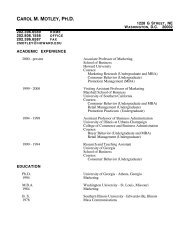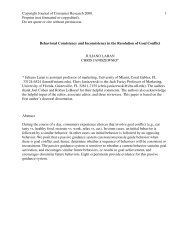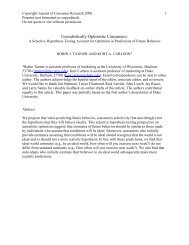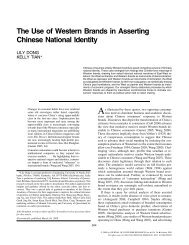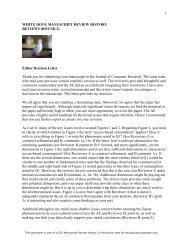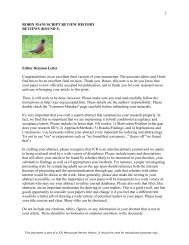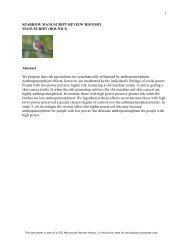Why Happiness Helps You See the Big Picture - Journal of ...
Why Happiness Helps You See the Big Picture - Journal of ...
Why Happiness Helps You See the Big Picture - Journal of ...
You also want an ePaper? Increase the reach of your titles
YUMPU automatically turns print PDFs into web optimized ePapers that Google loves.
Copyright <strong>Journal</strong> <strong>of</strong> Consumer Research 2008.<br />
Preprint (not formatted or copyedited).<br />
Do not quote or cite without permission.<br />
12<br />
or <strong>the</strong> unhappiest day <strong>of</strong> <strong>the</strong>ir life and <strong>the</strong>n rated <strong>the</strong> task (1 = boring, bad, unpleasant; 7 =<br />
interesting, good, pleasant).<br />
The next task, titled ―Task Description Survey,‖ measured construal level.<br />
Participants were instructed that any product (e.g., detergent) can be described in terms <strong>of</strong><br />
a superordinate category (e.g., cleaning product) or in terms <strong>of</strong> a subordinate exemplar<br />
(e.g., Tide). They were instructed fur<strong>the</strong>r that <strong>the</strong>y would be provided with <strong>the</strong> name <strong>of</strong> a<br />
product and that <strong>the</strong>y should list <strong>the</strong> first associations that came to mind. All participants<br />
provided <strong>the</strong>ir first associations with <strong>the</strong> word ―soda.‖ Each participant’s association was<br />
subsequently coded for level <strong>of</strong> construal. Participants also evaluated <strong>the</strong>ir word<br />
association in terms <strong>of</strong> how positive <strong>the</strong>y thought it was (1 = not at all, 7 = very positive),<br />
how easy it was for <strong>the</strong>m to come up with <strong>the</strong> association (1 = not at all, 7 = very easy),<br />
how much effort <strong>the</strong>y put into coming up with <strong>the</strong> association (1 = none, 7 = a great<br />
deal), how quickly <strong>the</strong> association came to mind (1 = very slowly, difficult to generate; 7<br />
= very quickly, easy to generate), how much attention <strong>the</strong>y paid to this task (1 = very<br />
little, 7 = very much), how much effort <strong>the</strong>y put into coming up with an unusual<br />
association (1 = very little, 7 = very much), and how unusual <strong>the</strong> association was (1 = not<br />
at all, 7 = very unusual).<br />
The final task measured choice between academic pursuits and friendship. All<br />
participants were asked to read carefully and imagine <strong>the</strong>mselves in a scenario titled ―Making<br />
Choices in Daily Life,‖ which described a situation in which <strong>the</strong>y had to make a choice between<br />
studying for an exam and meeting an old and very close friend who happened to be in town for<br />
one night (adapted from Koo, Labroo, and Lee 2006). Participants read <strong>the</strong> following paragraphs<br />
(<strong>the</strong> order <strong>of</strong> first two paragraphs, except for <strong>the</strong> first line, was counterbalanced):<br />
Jack is reading his notes for his final exam. Jack has been studying hard<br />
and has been over <strong>the</strong> material several times, but <strong>the</strong> final is known to be<br />
very difficult and <strong>the</strong> grade from this course is extremely important to<br />
Jack. Jack intends to major in this area and feels that his graduate school<br />
scholarship may be linked to doing well in this and o<strong>the</strong>r similar courses.<br />
Academic grades and doing well at college are very important to Jack.<br />
Just <strong>the</strong>n, his best buddy from high school, John, unexpectedly calls him<br />
on his cell phone. John lives in a different town far away and is visiting<br />
only for one night. Jack has not met John in a long while and is unlikely to<br />
be meeting with him again anytime soon, because John is going away to<br />
college overseas. Jack wants to catch up with his buddy, and John suggests<br />
coming over to Jacks place for a few hours. Jack knows that it will be fun<br />
to spend time catching up on old times.<br />
It’s already late in <strong>the</strong> evening, and Jack wants to spend several more<br />
hours reading for his final. On <strong>the</strong> o<strong>the</strong>r had, John and he go back a long<br />
way, and he really wants to spend <strong>the</strong> time with John.<br />
After reading this scenario, participants answered <strong>the</strong> following questions: ―If you<br />
were Jack, how likely would you be to continue studying for <strong>the</strong> final‖ (1 = not at all, 7<br />
= very likely); ―If you were Jack, how likely would you be to spend <strong>the</strong> evening with<br />
John‖ (1 = not at all, 7 = very likely [reverse coded]); and ―If you were Jack, what<br />
would you do‖ (1 = study for <strong>the</strong> final, 7 = spend <strong>the</strong> evening with John [reverse



